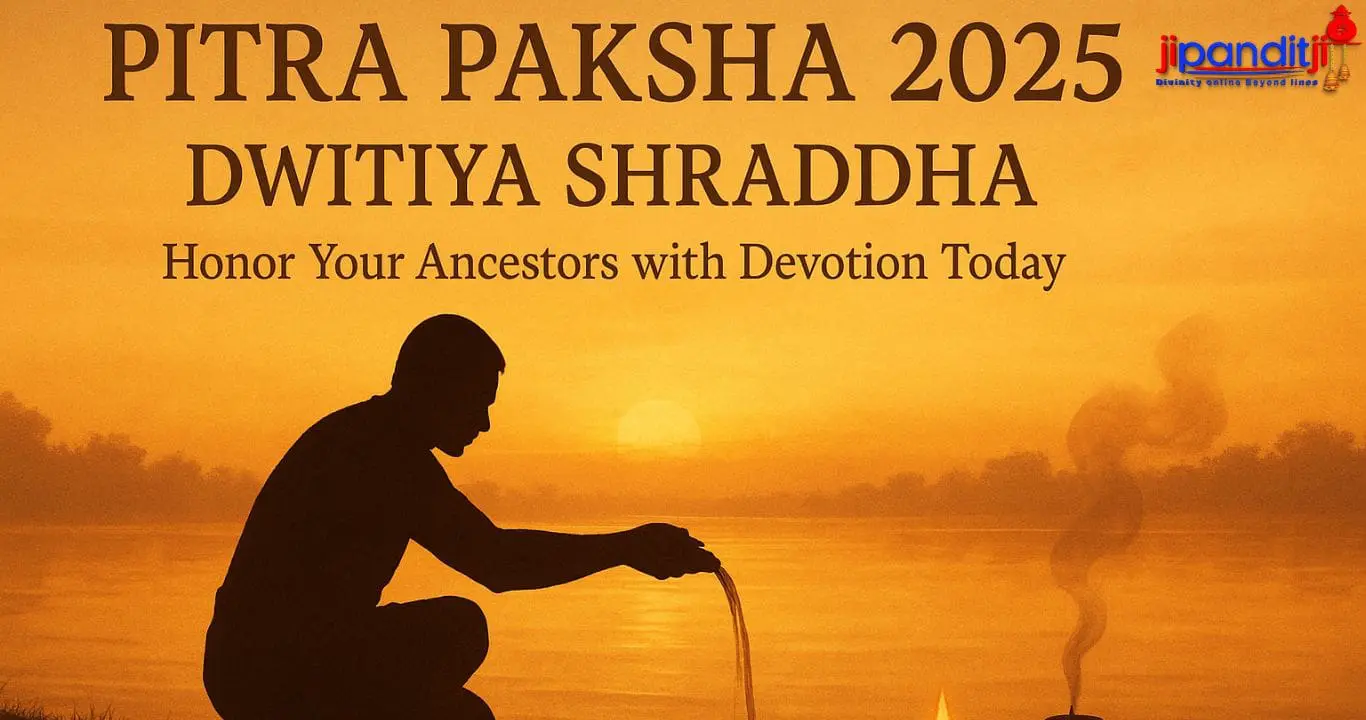Pitra Paksha 2025: Dwitiya Shraddha – Honor Your Ancestors with Devotion Today

The sacred fortnight of Pitra Paksha (also known as Shraddha Paksha) is regarded as one of the most spiritually powerful and karmically significant periods in the Hindu calendar. This 15-day phase is wholly dedicated to remembering, honoring, and expressing gratitude to the souls of our ancestors. It is believed that during this period, the departed souls descend to the earthly realm and accept the offerings made by their descendants. Among all the days of Pitra Paksha, the Dwitiya Shraddha, observed on the second lunar day (Dwitiya Tithi), holds immense significance.
Dwitiya Shraddha is particularly performed for those ancestors who departed on the Dwitiya Tithi. The rituals performed on this day are said to provide peace to their souls, help them attain higher realms, and ensure their blessings for the family. For modern households, this observance is not only about a religious duty but also about reconnecting with their roots and acknowledging the lineage that sustains them. Performing Dwitiya Shraddha with devotion brings prosperity, removes obstacles, and strengthens spiritual ties between generations.
Understanding Pitra Paksha and the Role of Dwitiya Shraddha
The term Pitra Paksha translates to “Fortnight of the Ancestors.” It occurs during the waning phase of the lunar month of Bhadrapada or Ashwin (depending on the regional calendar). This phase is considered highly auspicious for conducting ancestral rites such as tarpan, pind daan, and shraddha. The essence of this observance lies in gratitude—acknowledging the sacrifices of forefathers and seeking their blessings for a prosperous life.
Dwitiya Shraddha specifically focuses on honoring those who passed away on the Dwitiya Tithi. The ritual ensures that the souls receive proper nourishment in their spiritual journey. According to the scriptures, failing to perform these rites may lead to ancestral dissatisfaction, which can manifest as Pitra Dosh in the family’s life. Conversely, performing Shraddha ensures peace, harmony, and prosperity across generations.
Importance of Dwitiya Shraddha in Family and Society
Dwitiya Shraddha is not just a religious ritual; it carries cultural, social, and emotional dimensions. In Hindu philosophy, ancestors are believed to be the guiding forces behind a family’s well-being. When satisfied, they shower blessings in the form of prosperity, harmony, and progress.
Spiritually, Shraddha is a way to help departed souls move closer to moksha (liberation). The offerings made during this ritual act as an energy exchange, where food, water, and prayers nourish the souls in their journey. Culturally, it reminds us that we are part of a larger chain of existence. Socially, it brings families together, creating a sense of unity and continuity across generations.
For individuals, Dwitiya Shraddha helps remove obstacles in career, finances, health, and relationships by resolving karmic imbalances linked to ancestral debts (Pitra Rin). This is why many households prioritize performing Shraddha even amidst modern lifestyles and hectic schedules.
The Ritual Process of Dwitiya Shraddha
The rituals of Dwitiya Shraddha are carried out with utmost devotion, discipline, and purity. The sequence is deeply symbolic, and each step is considered essential for fulfilling the duty towards ancestors.
The day begins with the performer, traditionally the eldest son or male member of the family, taking a sacred bath before sunrise. This act symbolizes purification of the body and mind. The ritual space is prepared with sacred items like kusha grass, black sesame seeds, barley, ghee, and rice.
The first part of the ceremony involves tarpan, where water mixed with sesame seeds and barley is offered while chanting mantras. This act quenches the thirst of ancestors and symbolizes eternal connection. Next comes pind daan, where rice balls mixed with barley flour, ghee, and honey are offered as symbolic food to the departed souls. These pindas are later offered to sacred animals or placed in holy rivers, completing the cycle of giving.
Following this, Shraddha Bhojan is organized, where Brahmins or priests are served food representing the ancestors. Feeding them is considered equivalent to feeding the souls directly. Finally, charity and donations are made to the needy, including clothes, grains, and dakshina. These acts of selfless giving amplify the spiritual benefits of the ritual.
Interestingly, while men traditionally perform Shraddha, many modern families allow women to take part, especially when no male heir is present. Scriptures also mention that sincerity of devotion matters more than the performer’s identity.
The Modern Relevance of Dwitiya Shraddha
In today’s fast-paced world, rituals like Dwitiya Shraddha often seem challenging to follow. Urban lifestyles, nuclear families, and lack of access to traditional priests make it difficult to perform elaborate ceremonies. However, the core of Shraddha lies not just in rituals but in intention. Even simple acts like offering water, lighting a lamp, or donating food with devotion are considered highly meritorious.
Modern spiritual leaders often emphasize that Shraddha is less about ritualistic perfection and more about gratitude. It is an acknowledgment that we are indebted to our forefathers for the life, culture, and opportunities we have today. By honoring them, we align ourselves with the cosmic cycle of giving and receiving.
Recent surveys and cultural studies suggest that families who observe Shraddha feel a deeper spiritual connection to their heritage. Approximately 72% of families in India report feeling more rooted and emotionally balanced when they honor ancestral traditions. This shows that beyond religious obligations, rituals like Dwitiya Shraddha strengthen family values and cultural identity.
The observance of Pitra Paksha Dwitiya Shraddha is a blend of devotion, responsibility, and gratitude. It is not simply about following tradition but about recognizing the eternal bond between the living and the departed. Performing Shraddha on this day ensures peace for ancestors, blessings for descendants, and removal of obstacles caused by unsettled karmic ties.
As we celebrate Dwitiya Shraddha 2025, let us embrace it as an opportunity to honor our forefathers with sincerity. By doing so, we not only ensure their spiritual upliftment but also invite harmony, prosperity, and divine protection into our lives. Dwitiya Shraddha reminds us that while generations come and go, the thread of love and gratitude binds us eternally.


